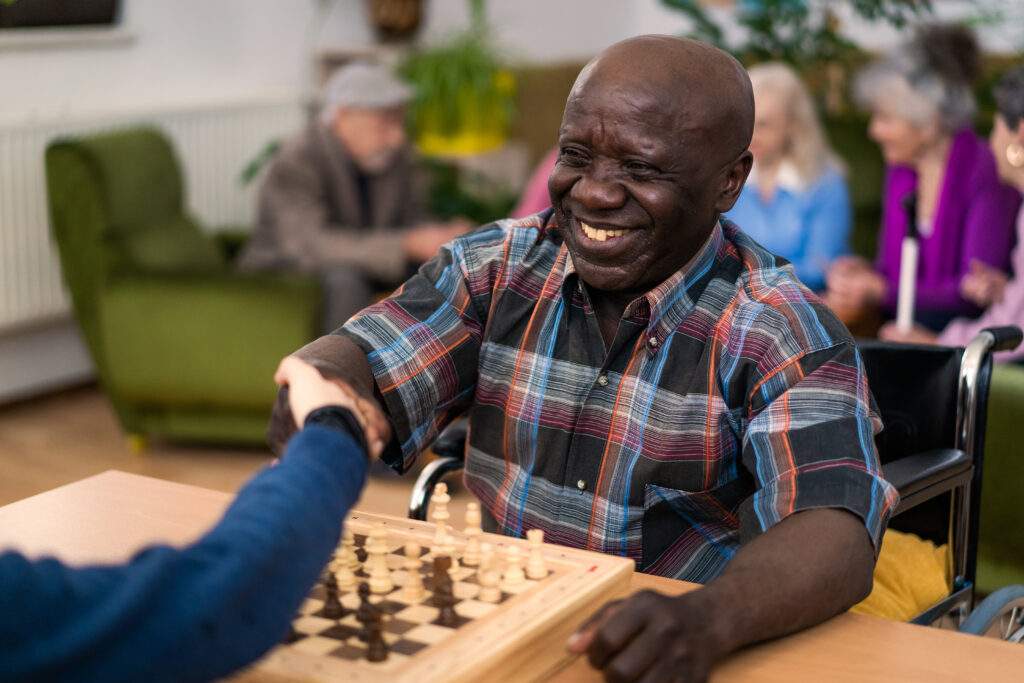
Alzheimer’s disease is the top neurodegenerative disorder in the world. The Centers for Disease Control and Prevention (CDC) estimates that 5.8 million Americans live with Alzheimer’s in the United States. Twenty-one percent of Black Americans over the age of 70 have Alzheimer’s disease and older Black Americans are twice as likely as their white counterparts, to have Alzheimer’s or another type of dementia.
“Alzheimer’s disease is the most common form of dementia. It is a progressive neurological disorder that gradually damages the brain, leading to memory loss, confusion, and difficulty with thinking and daily activities,” Shardae Showell, PhD., explained to BlackDoctor.org.
Showell, the Associate Director, of Clinical Development, Alzheimer’s at Biogen said that their goal at the 2024 Alzheimer’s Association International Conference was to present new data that would foster a dialogue within the community in support of “enhancing the inclusion of underrepresented populations in Alzheimer’s disease clinical trials.”
What are Clinical Trials?
Clinical trial research is imperative to developing new treatments for diseases as they supply crucial data necessary for drug and treatment approval. They allow eligible patients to receive treatments they otherwise would not be able to access.
Clinical trials progress in three main phases. Phase I trials focus on the safety and dosage of a treatment within a small group of participants. In Phase II, larger groups of participants – typically between 50 to 300 participants – assist researchers in determining a treatment’s efficacy and identifying potential side effects. Phase III trials test an even larger group of participants and focus on safety and effectiveness compared to already available treatments.
Benefits of Participating in an Alzheimer’s Clinical Trial
By participating in a clinical trial, volunteers assist researchers in learning more about a disease or condition, including its patterns and causes, as well as how the disease and potential treatment affect various groups of people.
“While there is no cure, there are treatments that can manage symptoms and potentially delay disease progression to improve the quality of life for both patients and caregivers,” Showell explained.
Clinical trials that focus on enrolling participants in diverse populations, provide a significant benefit to Black Americans. Dr. Showell explained that the industry is aware that mistrust of the healthcare system alongside a lack of access to clinical research sites and specialists are a few common barriers to clinical trial participation in diverse communities.
“Racial inequities in clinical trials is a problem for the entire industry, across therapeutic
areas,” Showell told BlackDoctor.org. “Alzheimer’s disease trials historically have struggled to enroll participants from the Black and African American community. Overall, trials have had an average of 2-3% representation.”
Clinical trial research is a crucial step in the development of these drugs and participating in a trial offers patients an opportunity to be at the forefront of both medical advancement and potential management of disease.
For example, the drug (donanemab) Kisunla was recently approved by the US Food and Drug Administration to treat Alzheimer’s disease. During clinical trials, Kisunla slowed the pace of thinking declines in early-stage Alzheimer’s patients.

Types of Clinical Trials for Alzheimer’s Disease
In addition to Kisunla and the drug Leqembi – which was approved for Alzheimer’s treatment in 2023 – additional drugs and other non-drug treatments are currently in the clinical trial process.
Researchers in San Diego are currently enrolling Alzheimer’s participants with mild cognitive impairment in the VIVA-MIND study; the study is testing whether or not the study drug, varoglutmstat can prevent the formation of amyloid proteins (plaques that cause inflammation in the Alzheimer’s brain).
Thiamine – a vitamin that plays a pivotal role in brain function – takes center stage in the BenfoTeam clinical research trial. Researchers are evaluating whether high doses of benfotiamine can benefit people with mild Alzheimer’s disease by improving cognitive function and improving or preserving daily activities.
“In people with Alzheimer’s disease, reductions in brain glucose utilization track closely with cognitive decline and we already know that thiamine deficiencies can cause dementia,” Brangman explained to BlackDoctor.org. “We think people with mild cognitive impairment and Alzheimer’s disease may not be getting enough thiamine delivered to the brain.”
Sharon Brangman, MD is the Director of the Center of Excellence for Alzheimer’s Disease at Upstate Medical University in Syracuse, NY.
Finding a Clinical Trial for Alzheimer’s Disease
Patients may not know where to begin when it comes to locating an Alzheimer’s clinical trial specific to their needs. Conferences like the AAIC allow thought leaders to come together to help raise public awareness.
“We found effective practices that enhanced the recruitment of underrepresented participants, included webinars, site visits, brain awareness education programs, faith-based initiatives, non-profit organization partnerships, digital outreach, mobile research unit initiatives, and site-led programs,” Dr. Showell explained.
Additionally, sites like the BlackDoctor.org Clinical Trial Resource Center for Black Americans – a clinical trial research database – are committed to increasing enrollment of Black patients in a variety of trials.
Another resource, the Alzheimer’s Association TrialMatch database allows patients to answer a few simple questions and refines search results to assist patients and their caregivers in identifying clinical trials that could be a good match.
Considerations for Participation
Alzheimer’s disease is one of the top 10 main causes of death in the United States, so it stands to reason that patients may wish to participate in a clinical trial. Before making that decision, however, it’s important to have a conversation with your doctor.
Your doctor can work with you to determine whether or not you’re eligible to participate in a trial and evaluate any potential risks or side effects if you do participate. Making an informed decision when it comes to matters of your health and well-being should be the top priority, so reach out to your healthcare provider to weigh the pros and cons of your decision.
Final Thoughts
“We recognize that we have more work to do to increase diversity in our clinical trials. To achieve this, we need to understand which strategies and tactics have successfully enhanced
engagement and how we can continue to implement these efforts in our trials moving forward,” Dr. Showell explained. “It’s also crucial to gain a deeper understanding of the populations we recruited but were unable to enroll, identifying barriers to inclusion they faced.”
By the year 2060, it is estimated that 14 billion people will be diagnosed with Alzheimer’s disease. For patients currently living with Alzheimer’s participating in a clinical trial with the approval from a healthcare provider, could provide the patient with treatments that improve their quality of life for themselves as well as provide the benefit of medical advances for future generations.








